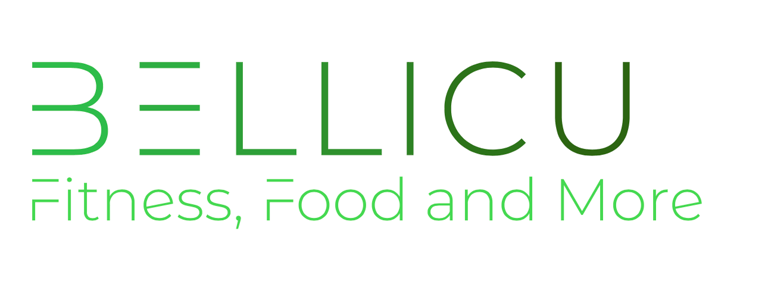

Magnesium for Muscle Recovery
Why Magnesium Could Be the Missing Link in Your Recovery Plan
You’ve dialed in your workouts. You’re eating enough protein. You even stretch and foam roll like a pro. But muscle recovery still feels incomplete—soreness lingers, sleep is erratic, and you wake up feeling more tired than refreshed. If this sounds familiar, you might be overlooking one of the most underrated recovery tools: magnesium.
Often dismissed as “just another mineral,” magnesium plays a central role in muscle relaxation, nervous system regulation, and energy metabolism. And when you consider how stress, hard training, and poor sleep deplete your magnesium stores, it becomes clear: this nutrient may be the key to optimizing your muscle repair, preventing cramps, and even sleeping better at night.
In this article, we’ll break down the science behind magnesium muscle recovery, compare the two most effective forms (glycinate and citrate), and give you a clear plan for dosage and timing—especially if you’re also trying to improve your sleep and reduce nervous tension.
What Does Magnesium Actually Do for Muscles?
Magnesium plays a central role in over 300 enzymatic processes in the human body—but when it comes to muscle recovery and athletic performance, its impact is especially profound. Below are the four key ways magnesium supports muscle health, with deeper insight into why it matters for anyone training regularly:
1. Regulating Muscle Contraction and Relaxation
Muscle contraction is initiated by calcium, but magnesium is required for relaxation. These two minerals work like a biological “on-off switch” in your muscle fibers. Without enough magnesium, calcium remains dominant—leading to prolonged contractions, cramping, and muscle tightness.
This is why magnesium deficiency is often linked to:
Muscle spasms and twitching
Nighttime leg cramps
Poor post-exercise relaxation
Magnesium ensures that muscles can release tension after they’ve fired. Without this release, muscles stay “locked,” which contributes to that heavy, sore feeling you might recognize after intense training.
2. Supporting ATP (Energy) Production in Muscle Cells
ATP (adenosine triphosphate) is the energy currency of your cells—and magnesium is required to stabilize and activate it. In fact, ATP must bind to magnesium to become biologically active. This is crucial during:
Strength training (when ATP is rapidly depleted)
HIIT or endurance sessions
Post-exercise muscle repair
Without adequate magnesium, your cells can’t efficiently produce or utilize energy, leading to:
Faster onset of fatigue
Slower muscle recovery
Decreased power output in repeated sets
So while most athletes think about carbs and protein for fuel, magnesium is the gatekeeper that makes cellular energy usable.
3. Reducing Inflammation and Oxidative Stress After Exercise
Exercise, especially high-intensity or eccentric movement (like heavy squats or downhill running), causes micro-tears in muscle fibers. This naturally triggers inflammation and oxidative stress, which is part of the recovery process—but if unchecked, it can delay healing.
Magnesium helps by:
Modulating inflammatory cytokines like IL-6 and TNF-alpha
Supporting glutathione production, your body’s master antioxidant
Reducing systemic inflammation markers in regular exercisers
Lower inflammation means:
Less muscle soreness (DOMS)
Faster tissue repair
A reduced risk of overtraining or injury
This is especially helpful for older adults, athletes in peak phases, or those recovering from injury.
4. Balancing Electrolytes to Prevent Cramping
Alongside potassium, sodium, and calcium, magnesium is a key electrolyte that keeps nerves and muscles firing properly. During exercise, especially in hot conditions or long endurance efforts, magnesium is lost through sweat.
Without replenishment, the risk of:
Muscle cramps
Impaired nerve conduction
Electrical imbalances in muscle cells increases significantly
Magnesium helps maintain:
Proper hydration at the cellular level
Stable nerve impulses for coordinated movement
Muscle pliability even under fatigue
This makes it especially important for:
Endurance athletes (runners, cyclists)
Heavy sweaters or sauna users
Athletes following low-carb diets (which can increase mineral losses)
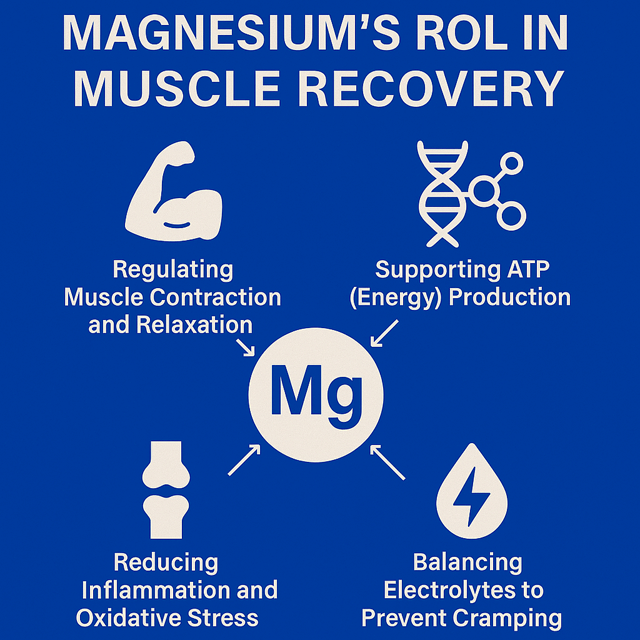

The Bottom Line: Why Magnesium Deficiency Slows You Down
When magnesium levels drop—even slightly—muscles become more prone to staying contracted, which can manifest as tightness, lingering soreness, or that frustrating “restless legs” feeling at night. This constant tension:
Prevents full muscle relaxation
Slows post-workout repair
Reduces sleep quality (which is essential for recovery)
As a result, your body doesn’t fully recover between sessions, making it harder to maintain performance, build muscle, or avoid injury over time.
Magnesium isn’t just a supporting player—it’s a core component of your recovery engine.
Magnesium Deficiency: Common and Often Overlooked
Magnesium deficiency is more widespread than most people—and even many athletes—realize. It’s often called a “silent” deficiency because traditional blood tests can miss the early signs. That’s because only about 1% of the body’s magnesium is found in blood plasma, while the vast majority is stored in bone and muscle tissue. So even if your blood levels appear normal, your functional magnesium status could be suboptimal, especially if you're highly active.
Why Are So Many Active People Deficient?
Athletes and fitness enthusiasts face a unique set of challenges when it comes to maintaining magnesium levels. Here are the main contributing factors:
1. Magnesium Loss Through Sweat and Urine
Every time you train—especially in warm or humid environments—you lose electrolytes through sweat. While sodium and potassium are commonly replaced, magnesium is often overlooked. Additionally, intense physical exertion increases urinary excretion of magnesium, which means the harder you train, the more you lose.
This makes endurance athletes, CrossFitters, and high-volume lifters particularly vulnerable to depletion, even if they eat reasonably well.
2. Modern Diets Are Low in Magnesium
Even if you eat “healthy,” your magnesium intake might be insufficient. That’s because:
Many people eat fewer leafy greens, legumes, nuts, and seeds, which are top magnesium sources.
Processed foods, refined grains, and sugary snacks contain almost no magnesium.
The magnesium content in vegetables has declined due to soil depletion in modern farming.
Athletes who follow low-carb, high-protein, or calorie-restricted diets may be at greater risk, especially if plant diversity is limited.
3. Chronic Stress & Poor Sleep Drain Magnesium
Magnesium is heavily involved in regulating the hypothalamic-pituitary-adrenal (HPA) axis, which governs your stress response. When you're constantly under pressure—whether from training, work, life stress, or poor sleep—your body uses more magnesium to:
Calm the nervous system
Produce stress-regulating hormones like cortisol
Stabilize heart rate and mood
This creates a vicious cycle: stress and sleep loss deplete magnesium, and low magnesium makes it harder to relax, sleep, or recover—further perpetuating deficiency.
4. Stimulants, Alcohol, and Medications Can Deplete Stores
Caffeine increases magnesium excretion in the urine.
Alcohol interferes with both magnesium absorption and retention.
Common medications like proton pump inhibitors (PPIs), diuretics, birth control pills, and certain antibiotics can significantly lower your magnesium levels over time.
If you're an athlete who relies on coffee, pre-workout, or drinks alcohol occasionally while also taking medication, this can compound your magnesium drain—even with a decent diet.
Symptoms of Magnesium Deficiency (Often Misread as Overtraining)
The early signs of magnesium deficiency often mimic those of overtraining, poor recovery, or even anxiety disorders, making it easy to overlook. Common symptoms include:
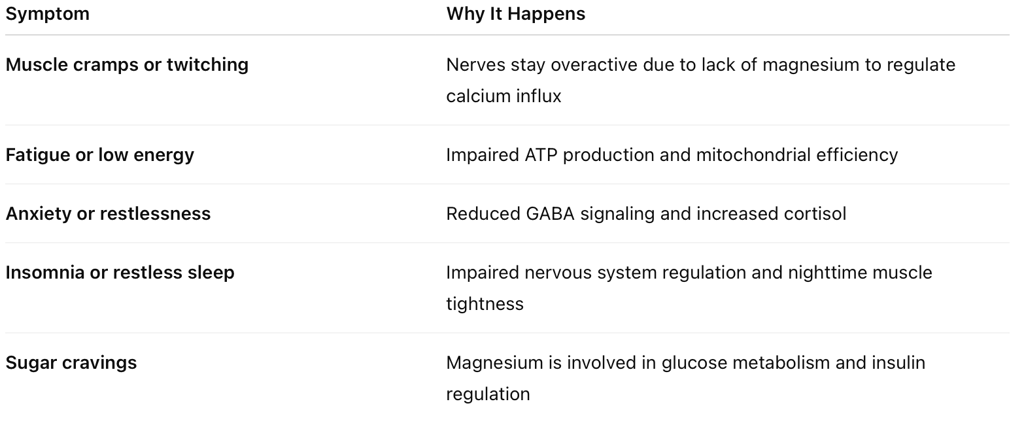

These symptoms may not appear all at once, and they often creep in slowly—making it easy to normalize suboptimal performance or mood without realizing magnesium is the underlying issue.
Functional Deficiency Is What Really Matters
Even if your magnesium blood levels fall within a "normal" lab range, your functional needs might be much higher—especially during:
Intense training cycles
High stress periods
Diet phases (e.g., cutting or prep)
Poor sleep weeks
This is why symptom-based assessment—alongside a review of training load, diet, stress, and sleep—is often a more accurate way to gauge whether supplemental magnesium is needed.
Magnesium Glycinate vs. Citrate: Which One Should You Choose?
With more than 10 different forms of magnesium available on the supplement market, choosing the right one for muscle recovery can be overwhelming. While options like magnesium oxide, chloride, malate, and threonate all have specific applications, glycinate and citrate are the two most effective and accessible forms for fitness-focused individuals.
Below, we compare them side by side—so you can choose the form that aligns best with your goals, schedule, and digestive sensitivity.
Magnesium Glycinate: The Calm Recovery Enhancer
What it is: Magnesium glycinate is formed by binding magnesium to glycine, a calming amino acid that also acts as a neurotransmitter.
Best for:
Improving sleep quality
Easing anxiety or restlessness
Reducing nighttime muscle tension
Calming the nervous system after evening workouts
Why it works: Glycine enhances the calming effects of magnesium by acting on GABA receptors in the brain—leading to a gentle sedative effect without causing drowsiness the next day. This makes it ideal for:
Athletes training late at night
Individuals with overactive nervous systems or high cortisol
People experiencing recovery anxiety—that constant internal pressure to perform or "do more"
Absorption & tolerance:
High bioavailability — easily absorbed through the small intestine
Gentle on the gut — unlike citrate, it doesn’t typically cause GI upset
Non-laxative — ideal for daily use, even on an empty stomach
Bonus benefit: Glycine itself is involved in collagen synthesis and may support joint and soft tissue repair—an added plus for lifters and endurance athletes under high physical load.
Use it if:
You struggle with stress-induced tightness, poor sleep, nighttime cramps, or want to wind down more effectively after intense training.
Magnesium Citrate: The Muscle Metabolism Supporter
What it is: Magnesium citrate is a form where magnesium is bound to citric acid, which enhances its solubility and makes it highly bioavailable.
Best for:
Supporting daytime energy and recovery
Replenishing magnesium lost through sweat
Combating post-workout cramping
Relieving occasional constipation or sluggish digestion
Why it works: The citrate form plays a dual role:
Delivers highly absorbable magnesium to restore intracellular levels post-exercise.
Mildly stimulates bowel movement, which can be helpful for athletes on high-protein or low-fiber diets.
This makes it ideal for:
Morning or midday dosing
Hot weather training or long-duration cardio
People prone to muscle cramps during or after exercise
Absorption & tolerance:
Excellent absorption, especially when taken with food
May have a mild laxative effect in higher doses, so start small
Not ideal for bedtime use due to its mild energizing nature
Bonus benefit: Citrate is part of the citric acid cycle (Krebs cycle), your body’s main energy pathway. This makes it a great partner for ATP production and cellular energy regeneration, particularly after strenuous sessions.
Use it if:
You’re looking for daytime recovery support, experience frequent cramps, or want to gently improve digestion without sedatives.
Glycinate vs. Citrate – Summary Comparison
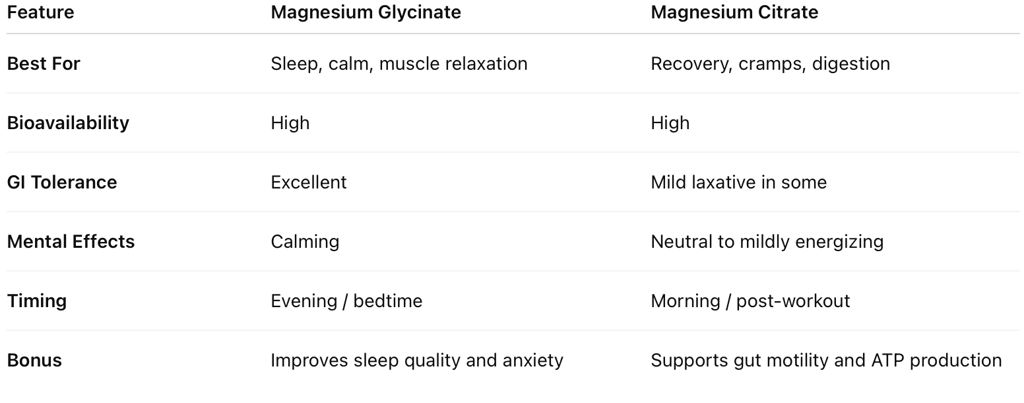

Magnesium Bisglycinate vs. Glycinate — What’s the Difference?
If you’ve been shopping for a high-quality magnesium supplement, you’ve likely seen both magnesium glycinate and magnesium bisglycinate listed—sometimes even on the same label. So what’s the difference?
Here’s the good news: they’re essentially the same thing.
Magnesium bisglycinate is the technically accurate chemical term, meaning the magnesium is chelated (bound) to two glycine molecules (“bis” = two).
Magnesium glycinate is simply a shortened, commercial label, often used interchangeably in the supplement world.
Both refer to a chelated form of magnesium that is:
Highly bioavailable
Gentle on the stomach
Calming for the nervous system
Ideal for sleep and muscle relaxation
There is no meaningful difference in effect between the two, as long as the supplement uses a fully reacted chelate and clearly lists the elemental magnesium dose (i.e., the actual magnesium content, not just the compound weight).
Watch Out For:
Magnesium blends that mix bisglycinate with cheaper forms (like magnesium oxide) but still market themselves as “glycinate.”
Products that don’t list elemental magnesium clearly—this makes dosing guesswork.
Tip: Look for Albion® or TRAACS®-labeled magnesium bisglycinate — these are lab-tested chelates trusted for purity and absorption.
Best Magnesium Forms by Use Case
To help you (or your readers) choose the right form, here’s a simplified table of the most common types of magnesium — including glycinate, citrate, malate, and others — plus what they’re best for:
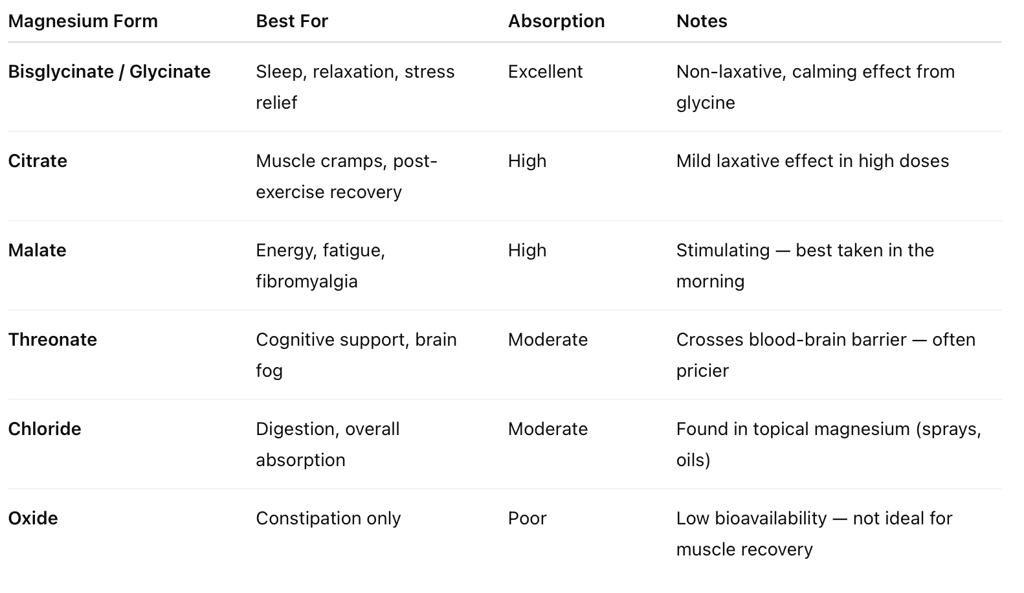

Can You Take Both?
Yes—and many athletes do. A combined approach works well for 24-hour recovery support:
Morning: Magnesium citrate with breakfast or post-workout meal
Evening: Magnesium glycinate 1–2 hours before bed for relaxation and muscle release
This combo:
Replenishes your magnesium stores efficiently
Supports daytime recovery and energy production
Helps you relax and sleep better at night
Just be sure not to exceed the total daily elemental magnesium limit (generally around 400–600 mg from supplements unless otherwise advised).
Best Timing for Magnesium Supplementation
Timing your magnesium intake properly can amplify its benefits:


How Much Magnesium Do You Need for Muscle Recovery?
The Recommended Daily Allowance (RDA) for adults is:
Men: 400–420 mg/day
Women: 310–320 mg/day
However, athletes and active individuals may benefit from 500–600 mg/day, particularly if sweating heavily or recovering from intense training.
Supplementation Guidelines:
Magnesium glycinate: 200–400 mg (elemental magnesium)
Magnesium citrate: 200–350 mg (watch for laxative effect)
Always check the “elemental magnesium” content on the label—not just the total weight of the compound.
⚠️ Caution:
These doses are not intended to be stacked without caution.
While you can combine glycinate and citrate, the total elemental magnesium from all sources (food + supplements) should generally stay below 600 mg/day, unless advised by a healthcare provider.
Too much supplemental magnesium—especially in citrate form—can cause diarrhea, nausea, or low blood pressure.
When in doubt, start with a lower dose and adjust based on your needs, diet, and tolerance.
Can You Get Enough Magnesium from Food?
It’s possible, but tricky. Some magnesium-rich foods include:
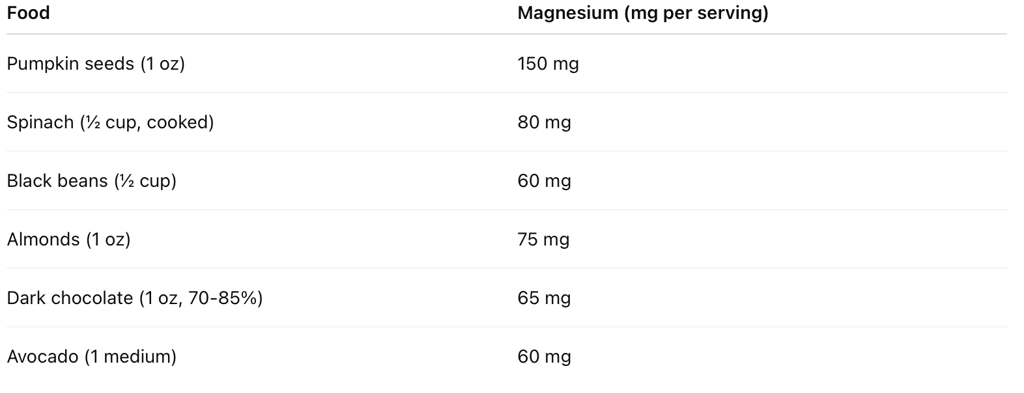

Even with a healthy diet, many people still fall short—especially if training depletes their stores faster than they can be replaced.
Sleep Synergy: Why Magnesium Works Best at Night
Sleep is when your body does the majority of its muscle repair and hormone regulation—making it arguably the most important part of any recovery plan. But if your sleep is shallow, interrupted, or delayed, you're leaving gains on the table and increasing your risk of overtraining.
This is where magnesium—particularly magnesium glycinate—shines.
Enhancing GABA: The Gateway to Relaxation
Magnesium glycinate supports sleep through its influence on GABA (gamma-aminobutyric acid), the brain’s primary inhibitory neurotransmitter. GABA functions like a brake system for your nervous system—it slows down excessive neuronal firing, promotes calm, and prepares your brain for deep sleep.
When magnesium binds to GABA receptors:
It reduces excitatory brain activity, helping you mentally wind down
It lowers cortisol, your stress hormone, especially in the evening
It increases melatonin sensitivity, enhancing your natural sleep-wake cycle
If you’ve ever felt “tired but wired” at night, this often points to low magnesium availability or poor GABA function—especially common in athletes, shift workers, or anyone under chronic stress.
Why Bedtime Is the Ideal Time for Magnesium
Taking magnesium in the evening (1–2 hours before bed) works synergistically with your body’s natural circadian rhythms and biological repair cycles. Here's what it can improve:
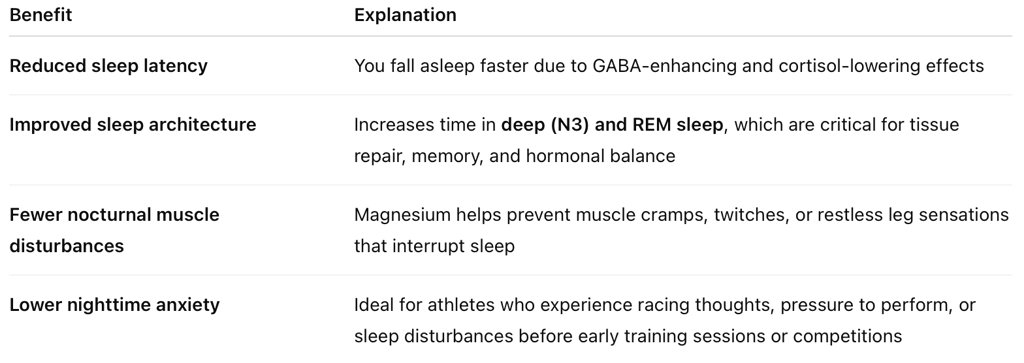

Backed by Science
Several randomized controlled trials have shown that magnesium supplementation improves sleep quality, especially in older adults, people with insomnia, and those under stress.
Key findings include:
Longer total sleep time
Fewer nighttime awakenings
Improved sleep efficiency and reduced cortisol levels
One study published in the Journal of Research in Medical Sciences (2012) found that magnesium supplementation significantly improved subjective measures of insomnia, including sleep onset latency, sleep duration, and overall sleep efficiency.
Recovery Multiplier: Why Better Sleep = Better Muscle Growth
Deep, uninterrupted sleep is when your body:
Releases growth hormone, which drives muscle repair and fat metabolism
Synthesizes muscle proteins, especially if you’ve trained that day
Clears metabolic waste and resets the nervous system
If you're getting 7–9 hours of high-quality sleep, your post-training recovery accelerates—reducing soreness, improving performance, and minimizing inflammation.
Magnesium doesn’t knock you out like melatonin or sleep aids. Instead, it creates a stable, calm physiological environment that supports natural sleep without dependency or grogginess the next morning.
Tips for Nighttime Use
To get the most from magnesium glycinate at night:
Take 200–400 mg of elemental magnesium about 90 minutes before bedtime
Combine with low light exposure and screen dimming to reinforce melatonin release
Pair it with L-theanine or ashwagandha if you’re sensitive to stress or have high nighttime cortisol
Avoid combining with calcium at night, which may compete for absorption
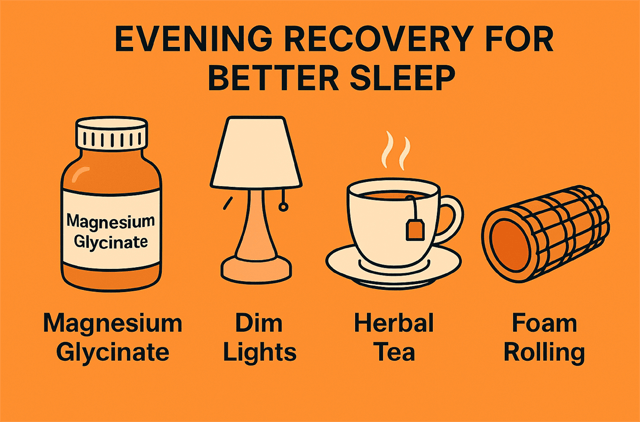

Combining Magnesium with Other Nutrients
Magnesium works even better when paired with recovery-supporting compounds:
Zinc: Often combined in ZMA supplements; helps with hormone balance and immunity
Vitamin B6: Enhances magnesium uptake in tissues
L-theanine or ashwagandha: For deeper sleep and stress reduction
Electrolyte blends: Ideal for hot-weather training or long endurance sessions
Avoid combining with calcium in the same dose—it may interfere with absorption.
Who Should Not Supplement Magnesium?
While magnesium is generally safe, certain groups should consult a healthcare provider first:
Individuals with kidney disease or impaired kidney function
Those on medications like diuretics, antibiotics, or heart meds
Anyone with a known magnesium allergy (rare)
Too much magnesium—especially from supplements—can cause diarrhea, nausea, or low blood pressure. Start low and build up.
Final Thoughts: Is Magnesium Worth It for Muscle Recovery?
If you’re training hard, struggling with soreness, or can’t seem to sleep deeply, magnesium might be your recovery missing link. Especially in the form of glycinate or citrate, this humble mineral can help relax tight muscles, ease nervous system stress, and improve your overall recovery outcomes.
The best part? It’s inexpensive, well-studied, and easy to integrate into your routine.
References
Magnesium and Exercise Performance
Study: Update on the relationship between magnesium and exercise
Source: Magnesium Research (Nielsen & Lukaski, 2006)
Link: https://pubmed.ncbi.nlm.nih.gov/17172008/
Summary: This review discusses how intense physical activity increases magnesium loss and demand, impacting muscle performance, recovery, and ATP production.Magnesium Improves Sleep in Insomnia
Study: The effect of magnesium supplementation on primary insomnia in elderly
Source: Journal of Research in Medical Sciences (Abbasi et al., 2012)
Link: https://www.ncbi.nlm.nih.gov/pmc/articles/PMC3703169/
Summary: A placebo-controlled trial showing that magnesium supplementation improved sleep time, sleep onset, and cortisol levels in older adults with insomnia.Magnesium’s Role in Human Health
Study: Magnesium in disease prevention and overall health
Source: Advances in Nutrition (Volpe, 2013)
Link: https://pubmed.ncbi.nlm.nih.gov/23674807/
Summary: A comprehensive review highlighting magnesium's impact on inflammation, cardiovascular function, and muscle physiology—especially under physical stress.Glycine and Sleep Quality
Study: Glycine ingestion improves subjective sleep quality in human volunteers, correlating with polysomnographic changes
Source: Sleep and Biological Rhythms (Yamadera et al., 2007)
Link: https://doi.org/10.1111/j.1479-8425.2007.00262.x
Summary: This study supports glycine’s ability to improve sleep latency and quality, reinforcing magnesium glycinate’s use for nighttime recovery.Magnesium Metabolism in Health and Disease
Study: Magnesium metabolism in health and disease
Source: International Urology and Nephrology (Musso, 2009)
Link: https://link.springer.com/article/10.1007/s11255-009-9548-7
Summary: A clinical review detailing magnesium’s essential role in muscle function, nerve activity, and intracellular energy pathways.Clinical Importance of Magnesium
Study: The importance of magnesium in clinical healthcare
Source: Scientifica (Schwalfenberg & Genuis, 2017)
Link: https://www.hindawi.com/journals/scientifica/2017/4179326/
Summary: Outlines the systemic effects of magnesium, including muscle relaxation, cardiovascular health, and the implications of deficiency in active individuals.Magnesium and Aging Muscles
Study: Magnesium and aging
Source: Current Pharmaceutical Design (Barbagallo & Dominguez, 2010)
Link: https://pubmed.ncbi.nlm.nih.gov/20388094/
Summary: Focuses on how magnesium protects against oxidative stress and supports neuromuscular health, particularly in aging populations.
